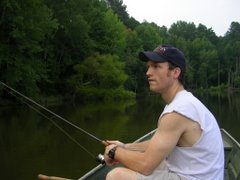I lived until the age of 13 in a suburb outside Chicago and finished my adolescent years at the littoral of urban Illinois, Kankakee. My religious experience during this time was in the context of a Southern Baptist church (very few of my friends were Southern Baptist but rather Catholic). Upon reflecting over these formative years, I have come to realize a variety of things.
I believe I was led or taught--intentionally or unintentionally, I don't know--by the church to believe essentially that Christians don't have questions or doubts or at least not to admit them. I never remember hearing probing questions about scriptures, theology, how these things line up, and how our beleifs measure up to the ideologies by which we actually lived our lives here on Earth. When questions were broached they often were greeted with, "well the obvious answer is ....". It was taboo, not to know or at least come off as knowing the answer, because if the Bible is inerrant, infallible, and the Word of God then how can we have questions.
Of course, as a child, I didn't feel free to inquire further out of fear for how I would be perceived. Instead of these questions being addressed up front and sincerely by those in my church they were presented to me by those outside of the church. What is the irony there? I believe the truths in the scripture stand up to scrutiny. I believe we should not hide from scrutiny. I also believe that we don't need to contrive answers in order to create a facade of absolute certainty in all matters. I believe it is okay to say, "I don't know".
I believe we should read views as understood by others outside our circle of friends or 'believers'. These actions give value to what we believe and hold us accountable to those whom we share time and space with here on Earth. I believe time is not well spent by always reading literature telling us what we already hold to or believe or literature that tells us how others believe from our own perspective. It has its place but not at the level which I grew up seeing people invest.
For a non-threatening example. As a teacher, a time might exist when I am seeking to bring in a guest speaker to my science classroom to discuss the pros and cons of a career in nanotechnology and the details of what that career involves. In seeking out that speaker, I am not going to bring in a jazz musician who read an overview of careers in nanotechnology in Time or Newsweek magazine. I am going to bring in someone who is living, working, and existing in the world of nanotechnology and intimately knows that world. I believe this person has the ability to give a true perspective on what a career in nanotechnology entails. I will concede that this person may or may not have a bias, but that bias is part of the view of a person in that career and is important to know. This experience should not stand alone but should be accompanied with thoughtful reflection and dialogue. Not all of my students will find this career interesting or worth pursuing; however, they are better informed to make their decision and to discuss that decision than if they had been informed by the aforementioned jazz musician. (No intention to denigrate jazz musicians:-O)
Tuesday, January 23, 2007
Subscribe to:
Post Comments (Atom)

1 comment:
Most excellent blog entry, Paul. The formal Christian Education most children receive in their church's Sunday Schools has been simplified and sanitized. We don't expect children to be able to reason as well as adults. We don't expect children to deal with complex logical and philosophical problems until they've reached high school.
I believe that most children going through Catechism training aren't old enough either. I know I wasn't.
Such early Christian education lessons reminds me of the Moral Orel episodes shown on Adult Swim.
At first, the episodes reminded me of the Davey and Goliath show I watched at my grandmother's house after church, waiting for lunch to be prepared. However, I think they illustrate my point about children not being prepared for complex lessons as well as the dangers in over-simplifying lessons.
Morel Orel
==========================
I have also gone through similar stages of belief during my college days. One of my future blog entries will be about my belief transitions. All I can advise about this is to not be afraid of labels.
I applaud your brave journey and will endeavor to help you along the way.
You don't need to call me sensei when we're off the mat. :-)
Post a Comment